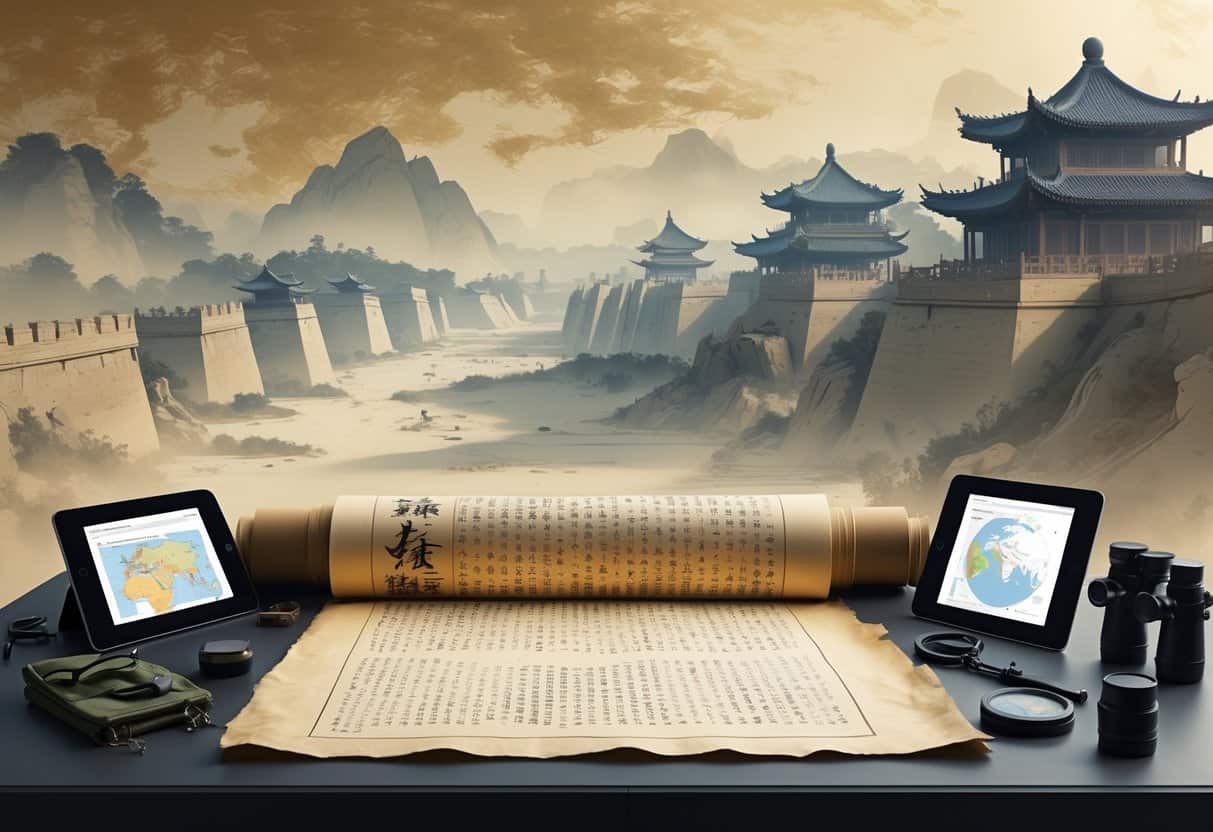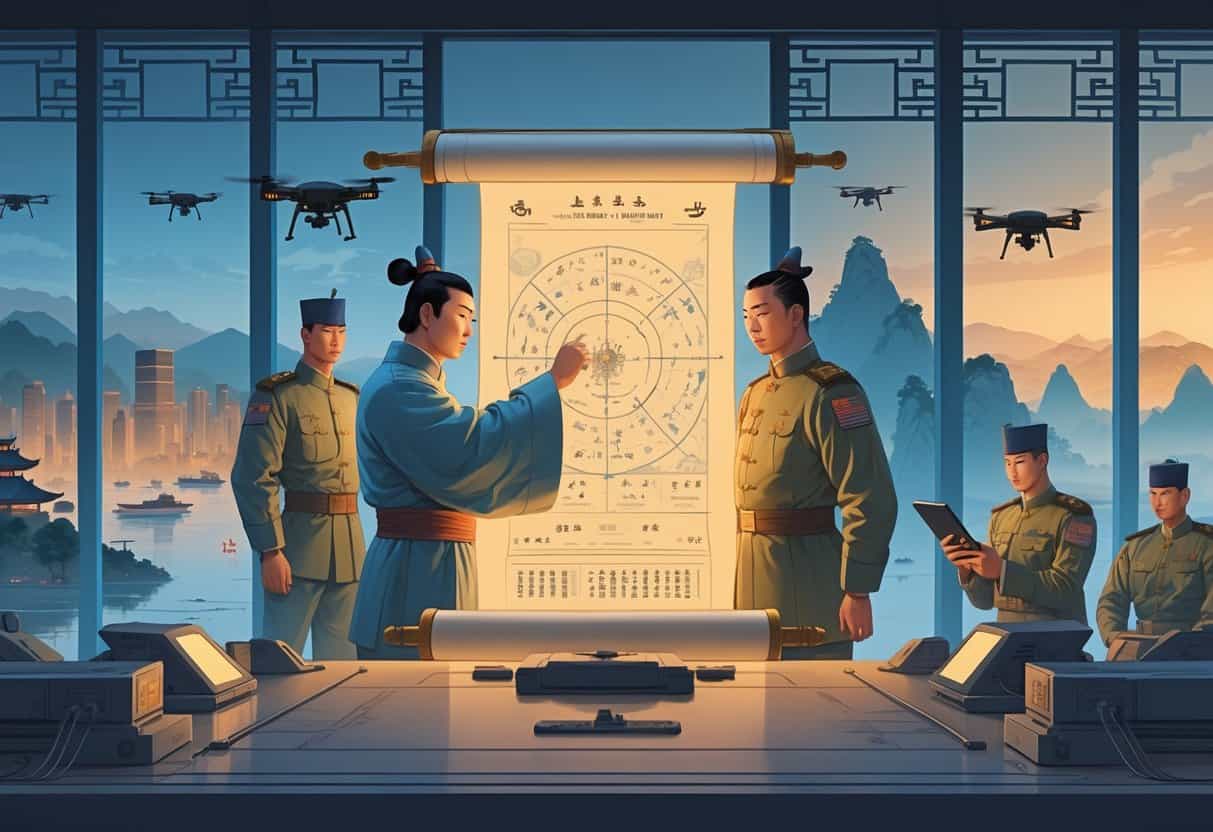Sun Tzu’s The Art of War is still a must-read. These lessons focus on planning, adaptability, and knowing where you stand—good advice for any conflict, really.
You’ll see that Sun Tzu’s ideas push for smarter, less costly decisions. It’s not just about fighting; it’s about thinking ahead and making the best use of what you have.

Even though Sun Tzu wrote centuries ago, his principles go way beyond old-school battle tactics. They’re about prepping for challenges, using information well, and leading when things get tough.
If you dig into these strategies, you’ll probably find yourself thinking more strategically in all sorts of situations.
This guide breaks down the core lessons from The Art of War and looks at why they still matter. Sun Tzu’s wisdom isn’t just for generals—it’s handy for everyday decisions and leadership moments too.
Key Takeaways
- Understanding and preparation matter most in conflict.
- Flexibility and knowing your environment give you an edge.
- Ancient strategic thinking can actually boost modern leadership.
Core Principles of Sun Tzu’s The Art of War

Strong leadership, smart planning, and honest self-awareness—these are the foundations of victory, according to Sun Tzu. Discipline and preparation let you use strategy wisely when things get rough.
Foundations of Strategy
Strategy starts with careful planning and knowing what you want. Before you act, study your surroundings, your opponent, and your own resources.
Sun Tzu actually says the best win is the one you don’t have to fight for. Use knowledge and strategy to steer clear of pointless conflict.
Timing, positioning, and gathering good intel are all part of getting ahead. Flexibility is key—change your tactics as the situation shifts and keep your opponent guessing.
Good strategy is about picking your moments. Sometimes you attack, sometimes you hold back. It’s all about controlling the outcome.
Virtues and Leadership
How you lead sets the tone for everyone else. Sun Tzu points to five virtues: wisdom, sincerity, benevolence, courage, and strictness.
A wise leader makes smart calls. Sincerity builds trust. Courage helps you face risks, and discipline keeps things on track.
Your character really does affect morale. Staying calm, confident, and ethical inspires people.
Leadership isn’t just about holding power—it’s about guiding with clear values and a steady hand.
Discipline, Preparation, and Training
Discipline is non-negotiable if you want to succeed. You’ve got to keep your team trained and stick to the rules to stay sharp.
Preparation means knowing your tools, your environment, and what you’re up against long before trouble starts. That’s both physical training and mental focus.
Regular practice builds confidence and skill. Without it, even a great plan can fall apart.
Discipline keeps everyone moving as one, which is honestly the heart of any victory.
Understanding Strengths and Weaknesses
Knowing your own strengths and weaknesses is a huge advantage. Sun Tzu’s big on self-awareness and sizing up your opponent too.
Don’t walk straight into a fight where you’re weak. Instead, play to your strengths and look for the enemy’s soft spots.
This takes clear thinking and honesty. Keep re-evaluating your position and be ready to adapt.
Success is about using what you know and not pretending you’re invincible.
Applying Sun Tzu’s Wisdom to Modern Warfare and Strategy
You’ve got to think clearly and adapt fast when new threats show up. Clever tactics—like deception and good intel—can give you a real edge.
Planning ahead makes it possible to win before the battle even starts.
Strategic Thinking and Adaptability
In modern warfare, thinking ahead and staying flexible is everything. Sun Tzu says you need to know when to pivot.
If you cling to one plan, you’ll get caught off guard. Adapting to new tech, shifting alliances, and curveballs from the enemy keeps you ahead.
Strategic thinking means seeing the big picture—your resources, your weaknesses, the whole field. Focus your energy where it’ll matter most.
This approach saves resources and brings different teams together. Being willing to learn and tweak your tactics is part of the deal.
Deception, Intelligence, and Use of Spies
Deception is a classic move, even now. You want to throw off the enemy, keep them guessing about your real intentions.
That might mean fake moves, misinformation, or even cyber tricks. Confusion lets you control the tempo.
Gathering intel is just as crucial. Spies, drones, satellites—whatever it takes to know where the enemy is and what they’re up to.
Good intel cuts down on risk and guides your choices. Sun Tzu’s clear: smart moves come from solid information.
Mixing human sources and tech gives you a fuller picture of the battlefield.
Decision-Making and Planning
Planning is the backbone of any win. Sun Tzu basically says you win or lose before the fight, depending on how you prepare.
You’ve got to weigh everything—terrain, troop strength, weather. That way, when things go sideways, you can make fast, solid decisions.
You won’t always have perfect info, so you’ll need to balance risk and reward. Training and strategic thinking help you pick the best move under pressure.
Coordination and teamwork are part of good planning. Getting everyone on the same page, building alliances, and having backup plans all help you deal with surprises.
Real-World Applications in Business and Beyond
Sun Tzu’s lessons aren’t just for the battlefield. You can use them to run a business, spark innovation, build partnerships, or just handle tough situations.
These ideas are rooted in strategy but fit into so many parts of modern life.
Business Strategies and Management
Using Sun Tzu’s ideas means focusing on planning, timing, and managing resources. Companies like Ford and GM lean on strategic planning to keep things running smoothly.
It’s about studying your competitors and the market before making big moves. That way, you cut down on risk and strengthen your spot.
Communication and clear leadership matter a lot. You need to keep your team coordinated and ready to adapt when things change.
This helps your business stay steady, even when the world gets unpredictable.
Innovation and Competitive Advantage
Sun Tzu pushes creativity to stay ahead. Innovators like Edison mixed trial and error with smart planning to create new things.
Protecting your ideas and reacting quicker than competitors gives you an edge. Sometimes it’s about small, smart improvements, not just huge leaps.
The real goal is a lasting advantage, not just a quick win. Keeping an eye on market shifts and new tools helps you hold onto your lead.
Collaboration, Networking, and Alliances
Nobody wins alone. Building alliances and a strong network gives you backup.
That might mean company partnerships or community efforts that boost your reputation. Trust and clear communication make teamwork work.
Use your network to gather info and resources. Good connections help you spot opportunities and steer clear of trouble.
Overcoming Challenges and Navigating Uncertainty
Sun Tzu’s all about being ready for hard times and staying flexible. Whether it’s business or life, you’ll hit unexpected bumps—think economic shocks or political messes.
Assess risks with care and always have a backup plan. When problems hit, stay calm and shift your tactics as needed.
Strong leadership and open communication keep your team focused. It’s easier to bounce back from setbacks if everyone’s on the same page.
Enduring Impact and Modern Lessons
Sun Tzu’s Art of War shaped leaders way beyond the battlefield. It blends practical strategy with values like integrity and benevolence.
These lessons still show up in military and civilian life. Knowing how deep its influence runs can help you use these ideas in today’s complicated world.
Shaping Leaders and Inspiring Personal Growth
Leadership lessons from Sun Tzu go far beyond tactics. He puts a spotlight on integrity, smart planning, and adapting as things change.
These values build trust and respect—pretty crucial for long-term success.
The Art of War also pushes self-awareness. If you know your strengths and weaknesses, you’ll make better decisions.
That focus on harmony between people and strategy? It’s a guide for balanced, ethical leadership.
Legacy in Military and Civilian Domains
Sun Tzu’s work is still a core military manual. Commanders have studied it for generations.
Even now, ideas like deception, surprise, and intelligence gathering shape defense strategies around the world.
But it’s not just for military folks. Business, sports, politics—you name it, his lessons fit.
You can use his thinking to outmaneuver competitors and handle complex problems. The Art of War really is a timeless guide for strategy, connecting all kinds of fields.
Essential Insights for Today’s World
You’re dealing with an environment that changes fast—sometimes faster than you’d like. Sun Tzu’s focus on adaptability? It’s all about acting quickly but also knowing when to change course if new facts pop up.
He talks a lot about careful planning. It’s not just about being prepared, though; it’s about using what you’re good at and not wasting your strengths.
If you bring these ideas into your daily problem-solving, you’ll probably get better at handling risks. Maybe you’ll even find yourself more likely to come out ahead, whether you’re facing competition or just a tough day.